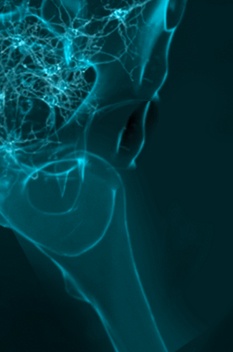Introduction
Peripheral nerve tumors can occur anywhere in the body. Most of them aren't cancerous ...
Approximately 12 percent of all women and men suffer from chronic pelvic pain or abdominal pain. Very often, this pain is associated with severe back ache and functional disorders of the pelvic organs. Diagnosis is difficult - all the more so if orthopaedic or neurological symptoms are also present. Are you one of those affected who are repeatedly forced to go to a doctor's office because the pain simply does not subside? Usually medications are prescribed, but a treatment option that addresses the true cause and solves the problem on a permanent basis is not offered.
Treatment of the causes of chronic pelvic pain
Neuropelveology is a discipline founded by Prof. Possover that focuses on diseases of the pelvic nerves and their diagnosis and treatment. In Neuropelveology, the more symptoms and dysfunctions, the easier and more reliable the diagnosis. If the parts of the body where the pain occurs do not correspond to its cause, this makes it very clear: The person suffering from the pain feels the pain in the nerve endings, i.e. in the pelvic organs or the corresponding areas of skin, yet the cause is to be found somewhere on the nerve pathways to the brain. The diagnosis is made in several steps, in which the type and cause of the pain (adhesions, endometriosis, inflammation or true nerve pain) are determined.
The pelvic nerves as origin for chronic pelvic pain or abdominal pain
Damage to the pelvic nerves can cause the following symptoms:
Depending on the cause, this pain often intensifies during bowel movements, when sitting and during menstruation.
If these pains are caused by the pelvic nerves, they are usually caused by trauma, injury or irritation of the following nerves:
Radiculopathy can also cause pain, i.e. irritation or damage to the pelvic nerve roots. The pain is often accompanied by bladder/intestinal dysfunction such as bladder retention, constipation, irritable bladder, irritable bowel and erectile dysfunction.
Deep infiltrating endometriosis of the sciatic nerve
A special form of pelvic nerve pain is deep infiltrating endometriosis of the sciatic nerve. In this disease, unbearable sciatic pain occurs - cyclically with the period at the onset of the disease, which becomes permanent after only a few months. In addition, there are disruptions or loss of mobility of the foot. The disease grows deep in the sciatic nerve and gradually destroys it. Hormone therapies do not bring about a cure. A surgical intervention must be performed immediately before irreversible nerve damage occurs. This operation is performed with the help of laparoscopy.
Gentle diagnosis and therapy by means of laparoscopy
With the help of laparoscopy, the organic causes of chronic pelvic pain can be reliably and gently identified and treated. The known causes of pain are adhesions, endometriosis and inflammation of the pelvic organs, but also various other diseases. Through laparoscopic exploration of the pelvic nerves, irritations, compressions, injuries or tumours of the pelvic nerves can be diagnosed and treated minimally invasively. Neurosurgical procedures using laparoscopy are used:
Pain reduction through electrical stimulation of the nerve
In the case of irreversible damage to the nerves e.g. due to surgical injuries, or in the case of diseases affecting the nerves such as multiple sclerosis, Parkinson's, etc., the release of the nerves alone is not a solution. In such cases, neuromodulation is the method of choice. A micro-stimulation electrode is placed directly on the damaged nerve by laparoscopy using the so-called LION method. Electrical stimulation of the nerve with low frequency current leads to pain reduction. With a remote control, the patient can regulate the intensity of the current output independently. This method also enables the normal function of the nerves to be restored if the patient suffers not only from pain but also from functional disorders of the pelvic organs, such as irritable bladder, faecal or urinary incontinence, or from sexual disorders, such as erectile dysfunction in men or loss of libido in women.
To help people in difficult situations to improve their quality of life has become his life's passion. Continuous research, decades of clinical experience and the focused determination to find a solution for previously unsolved medical problems, have enabled Prof. Possover to help often quite discouraged patients find release from their seemingly insurmountable problems.
Our team will take care of you
We will dedicate our expertise and know-how to help you find the solution that is right for you.
„As a cheerful, open and communicative person, I really appreciate coming into contact with people from all over the world. The well-being of others is very important to me.“
If it is your preference, your attending doctor is welcome to accompany you to Zürich. You will then have a person at your side who is familiar with your medical concerns. At the same time, your doctor will have the opportunity to be present during the planned operation and gain unique insights into the applied practice of Neuropelveology.

Neuropelveology is a medical discipline developed by Prof. Possover. It is based on the discovery of the pelvic nerves and includes the diagnosis of the diseases of these nerves by means of gynaecological examination methods and their treatment by means of laparoscopy.
Read morePeripheral nerve tumors can occur anywhere in the body. Most of them aren't cancerous ...
Vulvodynia is a chronic pain syndrome affecting respectively the vulva and occurs ...
Klausstrasse 4
CH - 8008 Zürich
Switzerland
E-Mail: mail@possover.com
Tel.: +41 44 520 36 00